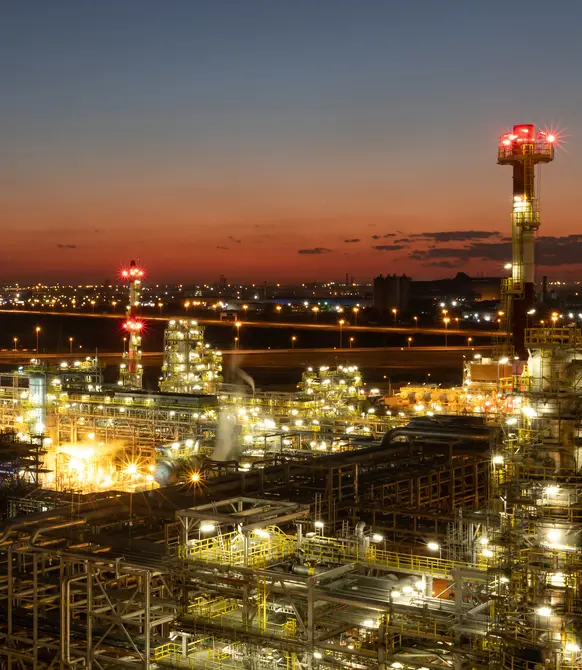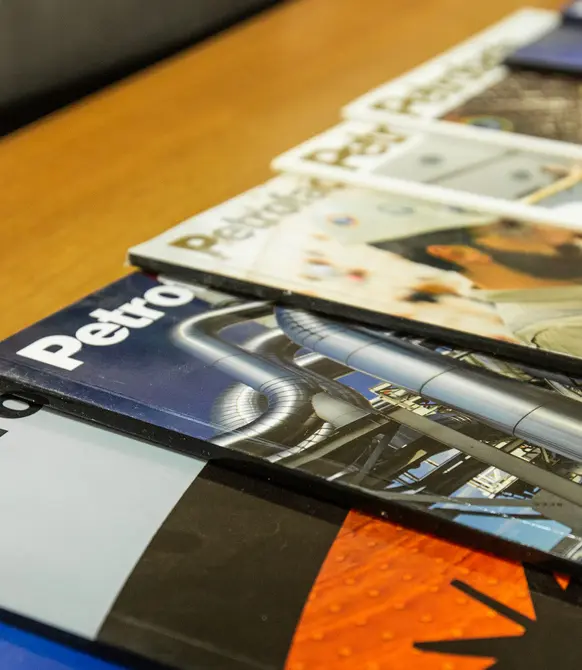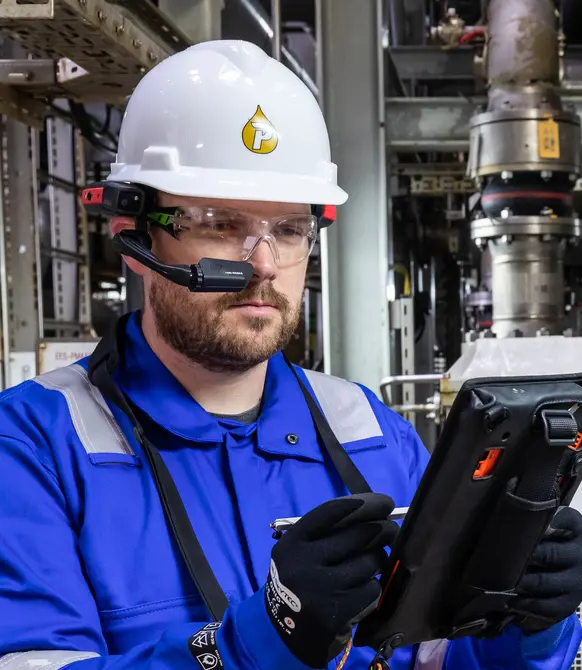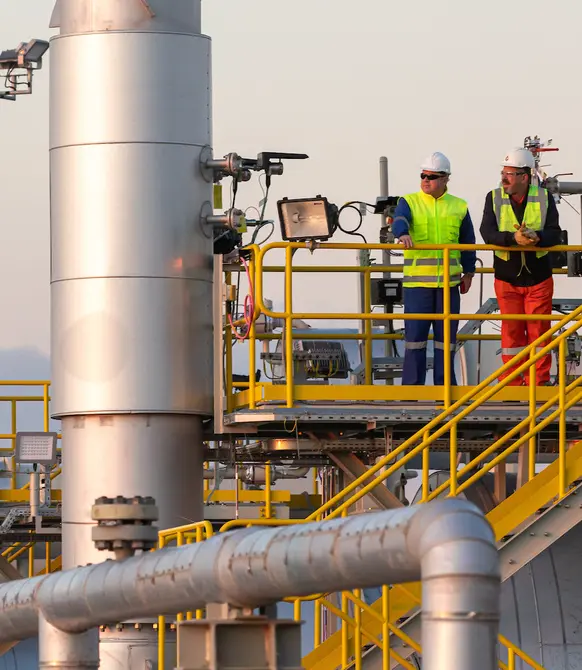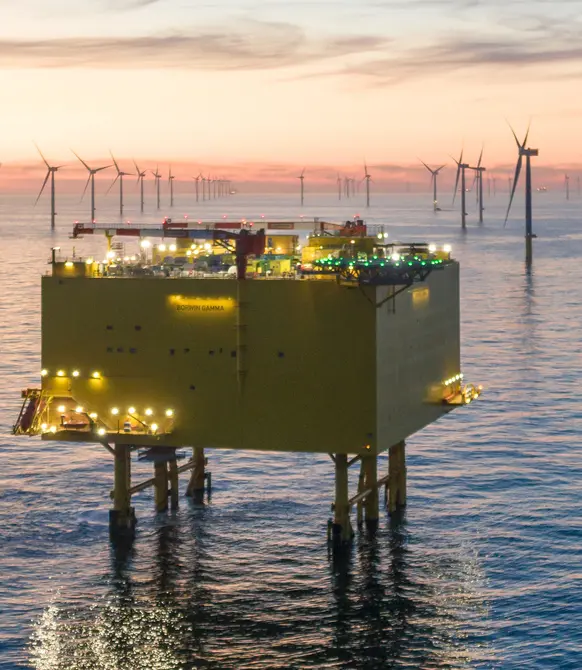Energy Talks
Building the future: Practical steps to power the Energy Transition
We welcome John Pearson, Chief Operating Officer, back to Energy Talks.
In this episode, we unpack the complexities of the industry's energy transition journey, Petrofac's crucial role in driving change, and how we can apply marginal gains across the energy mix.
Episode highlights
Marginal Gains in Energy Transition: How small, actionable steps can accumulate to create a significant impact in the Energy Transition.
Progress Report: The energy transition is underway, but not at the pace we need. While we’re moving in the right direction, practical, immediate actions are critical to achieving our goals.
Petrofac's Role in the Transition: From the TenneT 2GW programme to SAF (Sustainable Aviation Fuel) projects, Petrofac is at the forefront, building and operating the infrastructure needed for a sustainable energy future.
Overcoming Challenges: With economic and infrastructure challenges to overcome, why better incentives and swift action will propel the energy sector forward.
Looking Ahead: Why agility and efficiency are needed to meet the world's growing energy demands.
Energy Talks
John Pearson
Building the future
Transcript
Darren Hill (00:01):
Welcome back to Energy Talks, the podcast where we speak to the people powering the energy sector. I'm your host, Darren, and I've been joined once again by John Pearson, Petrofac Chief Operating Officer of Energy Transition Projects. In this episode, we'll be discussing the progress being made in energy transition, Petrofac's growing role, and how we can apply marginal gains across the energy sector. So sit back, relax, grab a cup of coffee and enjoy this episode. John, thank you so much for coming back onto Energy Talks. It's a pleasure. It's been a little while since we spoke, but last time we covered a lot. We talked about the energy transition, Petrofac's role in it, and obviously there's a lot of turbulence, so we're going to pick back up on that theme, but last time we started with the quote, so I want to start with the quote again. We talked about Arthur C. Clark last time. This time I want to talk about Dave Brailsford, obviously British cycling. His quote is, if you broke down everything you could think of that goes into riding a bike and then improved it by 1%, you'll get a significant increase when you put them all together. So what does that mean to you and is that something you apply to your work here at Petrofac?
John Pearson (01:03):
So I'm a big fan of marginal gains, and if you think about the energy transition, we are in a place where for all kinds of reasons, we've got a certain set of energy supplies that happen to emit more carbon than we like, and we need to change from that place to a place where we've got secure, affordable energy that emits less carbon. Lots of people focus on the great big ticket items and get very excited about that, but there are a million marginal gains that we can all deploy. You can start by insulating your house, you can drive your car less, you can recycle more. And to me, this is part of the answer. If we wait for some massive big bang, we'll wait a long time. We'll miss lots and lots of opportunities that we could do right now today in our own world, and the world tends to castigate the suppliers of energy, but the energy demand has to move before the energy supply keeps up with it. So big fan of marginal gains, and I'm sure we'll talk later, but there's 101 ways that applies to the energy transition.
Darren Hill (02:07):
Let's start from start with give an overview. So where are we just now in the energy transition? Are we moving fast enough? For example?
John Pearson (02:15):
We'll never be moving fast enough, but if you keep things really simple, are we in a better place or a worse place than when last we talked? I would say we're absolutely in a better place. Why? You don't have to go back. Many years before there were genuine debates on television about is climate change real and do we need to change, blah, blah, blah. But now you don't hear that. You hear debates about who needs to do, how fast do we need to go? You could look at a million indicators and find that there are real world things happening that all help us transition away from our current energy base to a better one. Are they fast enough? No. And again, it's really important to think about why that is. Not just to ring one's hands and say, oh, it's not fast enough, but a much better question. A Dave Brailsford question would be, if it's not fast enough, what do we have to do to make it faster? And that's the place that Petrofac can really help.
Darren Hill (03:12):
Are we waiting for the perfect solution? Is that what's one of the reasons it's holding us back? That seems to be the narrative in the media certainly at the moment where, well, this isn't going to be a like for replacement, so why are we bothering?
John Pearson (03:25):
To me, it's illogical to have endless debates about, for instance, is methanol better than ammonia for ships whilst we're not capturing carbon and storing it underground when we're not insulating our houses and when we're not doing basic things first. So to me, yes, it is fascinating that everyone characterises this as a technology challenge. There are definitely technology challenges and optimisations and they will be very important for us going forward, but a huge amount of what we can do right now, the technology is available, it's the economics, the momentum, and the kind of financial stimulus to get this done that's holding us back right now.
Darren Hill (04:04):
Where does our role fit into this?
John Pearson (04:06):
So we've got an easy, complicated role. All of that stuff doesn't matter a bit until someone builds a project and puts it into reality. It's all theory until you do that. And that's where we come in. We build the projects and we operate things that make the energy transition real. So it's a great market for us. The skills we have fit really well to what is needed. We do great big complicated projects in all kinds of places in the world. That's what people will need to deliver the energy transition.
Darren Hill (04:37):
What makes Petrofac a great fit for those as well?
John Pearson (04:40):
Since we last talked, where are we? We are progressing really, really well with the TenneT two gigawatt programme. That's this massive portfolio of high voltage DC connections for Holland and Germany where our client tenet, the Dutch and German grid want to connect the offshore wind farms back to the grid to power homes and industry, et cetera in Holland. So since I think we spoke last, we've now been awarded the second project. This is what the customer calls a convoy approach, which is exactly the right way to do these jobs. Design one build many, why wouldn't you do that, right? You wouldn't do anything else in life bespoke every single time. If we deliver well for Tenet, that's just an enormous calling card for us, certainly in the HVDC market, but just generally in offshore wind. It's one of the biggest programs in the world and we're in a great position on it. So good to see that's going well in the smaller but no less important HVAC offshore wind. We're progressing very well with a couple of opportunities there as ever. It's annoying. I can't tell you the exact status because the customer hasn't okayed it yet, but there's good news coming down the pike in that area, which is also good because we need to have multiple customers and it's nice to have multiple projects that we can cycle our people around and they can continue their learning.
Darren Hill (06:06):
Yeah, get that experience. Yeah. Do you see those projects, and particularly with the TenneT one because it is one of the largest in the world, and again, convoy and bridging into that modular approach, do you see that this could be sort of a legacy project and the fact that we are one of the first to do it, especially at this scale, and then we've got global expertise anyway? Do you see this sort of style being rolled out across the globe?
John Pearson (06:30):
I really hope so. To be honest. I've been hoping that for about 30 years in my career. But to me, we should standardise on any project, whether it's oil and gas or energy transition. We should standardise the maximum, customise the things that really make a difference, and then use smart digital and AI to help us get the thing done quickly. And this is the political engagement. It's really good that politicians have set a strategy that drives very clearly towards energy transition. The second phase of that, they've now said, right, we need to stimulate the market in some fashion because most markets need that. Offshore wind, frankly has needed it up until very recently. They need to give certainty on what the penalty is. If you keep permitting, they need to give certainty on what the incentives are because a lot of these projects are very large, which is great for us, but makes them very interconnected.
John Pearson (07:27):
Carbon capture is the classic example. You need someone who's got a store, you need someone who's got a transportation method, whether it's a vessel with port facilities or a pipeline or whatever. And then you need lots and lots of individual people who emit carbon to decide they're not going to emit it and they're going to put it into the pipe of the ship. And so there is a danger of a very big three legged race where everyone's like, yeah, I really, really want to do this, but before I can take the investment decision, I need to know how much the pipeline tariff is going to be and how much the storage charge is going to be and how much is the project and how can it get done and what's my emission trading scheme penalty or now benefit that I get by doing the right thing with the carbon?
John Pearson (08:14):
And that creates a lot of inertia in the system, which you can see moving now, but it's not moving fast enough for me, and it does need to be pushed along. Otherwise my worry is we're still here in five years time, wring our hands knowing it's the right thing to do, but we haven't done it yet. Hop to the side slightly. One of the reasons that we are deliberately technology neutral and that we deliberately focus on wind, carbon, hydrogen and biofuels is that it gives us lots and lots of optionality. And as our customers are thinking about what to do, where to do it, what makes economic sense, then we're super well placed to cover all. Because we are to degree project agnostic as well. We do tough jobs in tough places. There's a pretty good chance that we can follow our customers to wherever they need to go.
John Pearson (09:06):
And over the last few years, we've done a great job of building up our technology expertise to be able to advise customers in biofuel technology choices or hydrogen delivery methods. Things that unless you were an utter specialist five years ago, the world didn't know about these things. So I'm the worst one beats oneself up about where you are and what you're not doing, but we're doing really well in a market that's emerging and you look around, there's a lot of noise in the market and you always have to read through that to find the reality. I think our position in the market is as good as anybody's. It's an emerging market and it has twists and turns, but what we need is the economics to move so our customers actually get confidence to execute the projects, then we're in great shape.
Darren
So let's talk about hydrogen.
John Pearson (10:00):
If there was a prize for volume and conference space, I think hydrogen would win it. The good news, I guess underneath that, there is definitely this continuing genuine movement towards hydrogen. I think probably more green than blue. How do we get it? Where is it? How do we make it real? Let's bring it to market for a whole variety of uses. So if I talk about what we are doing at Petrofac and then maybe a comment on the wider market, we're progressing well supporting customers generally at the smaller end of the scale, but I'm good with that. I'd rather get sound projects that make economic sense moving again, marginal gains, build a track record for our customers and for ourselves with jobs that have real economics. And we find ourselves a lot now when people come and say, can you help? We say, yeah, of course we can help.
John Pearson (10:56):
But then we slightly look over our glasses at the project going, well, this one looks like it'll be a great concept, but probably not get to feed or final stage. But good news, particularly working with Prote, one of our main customers, we've got projects in the funnel there where to me, the economics looks real. They're eminently doable. They're a good size. They are around displacing natural gas for heat in industrial applications and also for hydrogen trucks that go from A to B to C to A. And so you can have refueling stations at each place that make a lot of sense. So again, I'd rather be in the market doing something real. There's a vast amount of European commission funding to help stimulate hydrogen projects. A tremendous oversubscription of the application for that. And a bunch of projects are now earmarked to receive the stimulation funding. They are big.
John Pearson (11:53):
They're going to be expensive and complicated and let's hope they accelerate and come to market. And the emerging direction seems to be a bit like let's just capture some carbon and get it underground is let's where we use ordinary hydrogen that's perhaps made through techniques that emit a lot of CO2 to atmosphere. Let's displace that with green hydrogen. So less domestic heating perhaps and more using the hydrogen for industrial applications. If you're trying to move a hydrocarbon based energy chain to something that's less CO2 emitting the H in hydrocarbon comes from our good friend hydrogen. So you need to have hydrogen and there's an amazing amount of things use hydrogen. And only when you start looking into it do you realise what hydrogen gets used for way away from fuels. So yes, hydrogen's here forever and will be part of its supply. And just whilst it's awful easy to get frustrated about the pace of progress and how many studies don't turn into later phase work, this is not an energy transition thing, right?
John Pearson (13:10):
Everything that one does in any industry, you plant lots of seeds, you don't expect them all to germinate, and that's just how it is, right? But if you stick with your customers, if you help them explore lots of options that might be incredibly important to them and their development, then I think that stands you really well for later, we become their trusted advisor. They know we're not going to just tell them what they want to hear, and we're not trying to sell our own technology. And we are the guys who will genuinely tell you if the job is doable, how much it's going to cost. And we had an instance a couple of weeks ago, I won't mention the particular project, where we were desperate for the job to go ahead. The customer was desperate. It was a fantastic energy transition project, and it would've been so tempting to try and chisel the cost down and down and down to make it economic, but we would've let our customer down. We would've let ourselves down and damaged our reputation in the long term. So to me, this is just part of what we do. The day we stop giving good advice, the day we don't help and follow our customers and end up being a bit selfish is a bad day, and we are not going to do that.
Darren Hill (14:27):
One of the best headlines I saw recently was Soaring on Sewage. Tell me a bit about that. For the uninitiated, who wouldn't have heard that headline?
John Pearson (14:37):
So many puns come to mind. So when you look at what people love to call use cases, one of the things that is in law is that we need to replace a percentage of aviation fuel with a more sustainable aviation fuel. And we need to do that rapidly in lots of different countries around the world. Of all the areas that we look at where there's more emergent technology, I would say biofuels is one where there are technologies that are proven but perhaps not fully scaled yet. And one of our most exciting projects is taking a byproduct of sewage and turning it into sustainable aviation fuel. The economics are great, the technology is well proven. There's customers lined up, and I'm super, super positive that that one will scale up and come to market relatively soon. This is important, right? We haven't got 10 years to waste chasing rainbows. We need to pick a rational, practical set of things, turn it into a plan, do the projects and deliver the improvements. We've got to do that.
Darren Hill (15:47):
Last time we spoke again, we spoke about infrastructure, and I think that's definitely something, I think in most developed countries anyway, that infrastructure was done, dusted. That's fine. Is that going to start to hold us back now that we just don't have the right infrastructure to get energy to the grids?
John Pearson (16:05):
Oh, it's holding us back already. Absolutely. These things matter, right? So if you've got the sort of physical fundamentals you need, you'll need geology that can store carbon. You'll need wind, you'll need sun, you need pipelines, you need ports, you need all these things. You need crucially a grid. And it's no surprise that if you look, the consumption of energy is moving to different places and the generation of energy is massively moving to different places. So a holistic view on infrastructure is key, and we're seeing that together. I'm much more positive about that. People are thinking in the UK and in Holland, in the gex about the people who have depleted oil and gas reservoirs are really thinking now, hang on, this is an asset, not a liability. People are thinking about how to repurpose pipeline networks to get carbon from where it's produced to where it needs to go.
John Pearson (17:10):
So that's good. The grid is a well understood challenge, but it's a massive, massive challenge. So just to put the grid challenge in perspective, in the UK where I vaguely remember the numbers, I was speaking to the lady who runs the grid and she was saying that the grid is notionally sized at about 76 gigawatts. They've got 500 and something gigawatts of connections waiting to be connected, of which they only think 120 might be real. So that's a massive issue. You can imagine. You've got to think about 500 knowing that only 20% of them might be real. But even then connecting 120 gig to a grid, that's 70 something and it'll all be in the wrong places. The uk, and these are not small projects. They involve offshore cables, substations, the planning permission, the consents. It is just a huge, huge issue to get us in shape. And time is crucial, right? Because we need to get the projects moving. And if you want to do something, your first question, planning permission, second question, grid connection,
Darren Hill (18:12):
And what's going to solve them?
John Pearson (18:15):
Well, the governments lent into this and said, look, we need to half the time to provide grid connections. That's great. The next challenge I think will be supply chain because, and potentially a good thing for fact, we have so much to be done across all of these markets in parallel. So you have a boom in Gridworks, you have a boom in offshore wind, you have a boom in carbon capture, et cetera, et cetera, et cetera. And to the earlier comments about design one build many using modular designs, digital methods, we have to get faster and more efficient at manufacturing these things rather than making them a bespoke suit every time. Yeah.
Darren Hill (18:59):
My final question, and this won't come as too much, so surprise, I asked you this last time as well, but I want to see if it's changed, if your thoughts have changed, if things have moved on sufficiently since then, so if there was no red tape and you had unlimited budget, how would you reshape the energy sector?
John Pearson (19:15):
We just need to move quicker. It's that most things in life, you know what the answer is, but you let stuff get in the way apart from you, none of us goes to the gym enough. It is there, right? We need to capture carbon by any and all of the means that we've been talking about in this podcast. We need to address the real barriers, which are mostly economic, I think in the near term and just get on with it. And I dunno on who that burden falls. But in part government, I think in part the people who have these projects who I think need to perhaps turn up the dial on the ESG sustainability element of their evaluation and just crack on, but it is quite frustrating that there's so much the world could be doing that we're still being too slow on, in my opinion. And I'm afraid that answer will be the same probably for all the podcasts we do for quite a swim time.
Darren Hill (20:16):
I suppose it's good though, because I think what I'll take from this is, is that we're taking the opportunities where we can, but we're getting incrementally better across the board to try and make a difference. And I think it's quite refreshing to hear the impatience, to be honest, because I think without a level or a degree of impatience, things don't happen and we're starting to make things happen.
John Pearson (20:41):
We definitely are, and this is the good news, perhaps as a place to conclude, this is not finding a cure for Covid. We know what we need to do. We can do that thing. We just need to get on with it a little bit quicker.
Darren Hill (20:53):
Brilliant. I'm going to weave us there. But thank you so much for your time today. It's so interesting to hear and get an update from you from our last podcast. So thank you John again for joining me.
John Pearson (21:02):
Thank you. Pleasure.
Darren Hill (21:03):
Thank you so much for listening to today's episode. If you enjoyed this one, go and check out our other podcast with John Pearson now and subscribe to make sure you don't miss another episode.


